Mattress Buying Guide: How To Choose A Mattress
Here's everything you need to consider when buying a new mattress, with ten top tips to make the process as easy as possible.
When shopping for a new mattress, there are a lot of different considerations to keep in mind. Do you know what features to look for, or what type suits you best? If you need some help, we’ve created a full walkthrough to help you make the best choice to suit your needs and budget.
What type of mattress is best?
A mattress is a very personal choice. One person’s best night’s sleep is another’s night of tossing and turning. This is down to factors like body type, sleeping position and sleeping needs.
To find the ideal mattress, you’ll need to consider these preferences and what you’d like to prioritise. While there are some general ideas you can use to make broad choices, such as firm feel being more suitable for a bad back, there are more technical considerations too.
To help you make the right decision, we’ll guide you through the different types of mattresses, as well as how to make sure you choose the right one for you.

What are the different types of mattress?
Learning how to choose a mattress comes down to tailoring around your specific needs and what you find most comfortable. Here are the main types you'll find in the UK:
Pocket sprung mattresses
- Long-lasting support
- No transfer of movement
- Total body support and pressure relief
- Targeted support to your most needed areas
- Springs adjust with you as you move
- Can be zoned to provide specific support to certain areas of your body
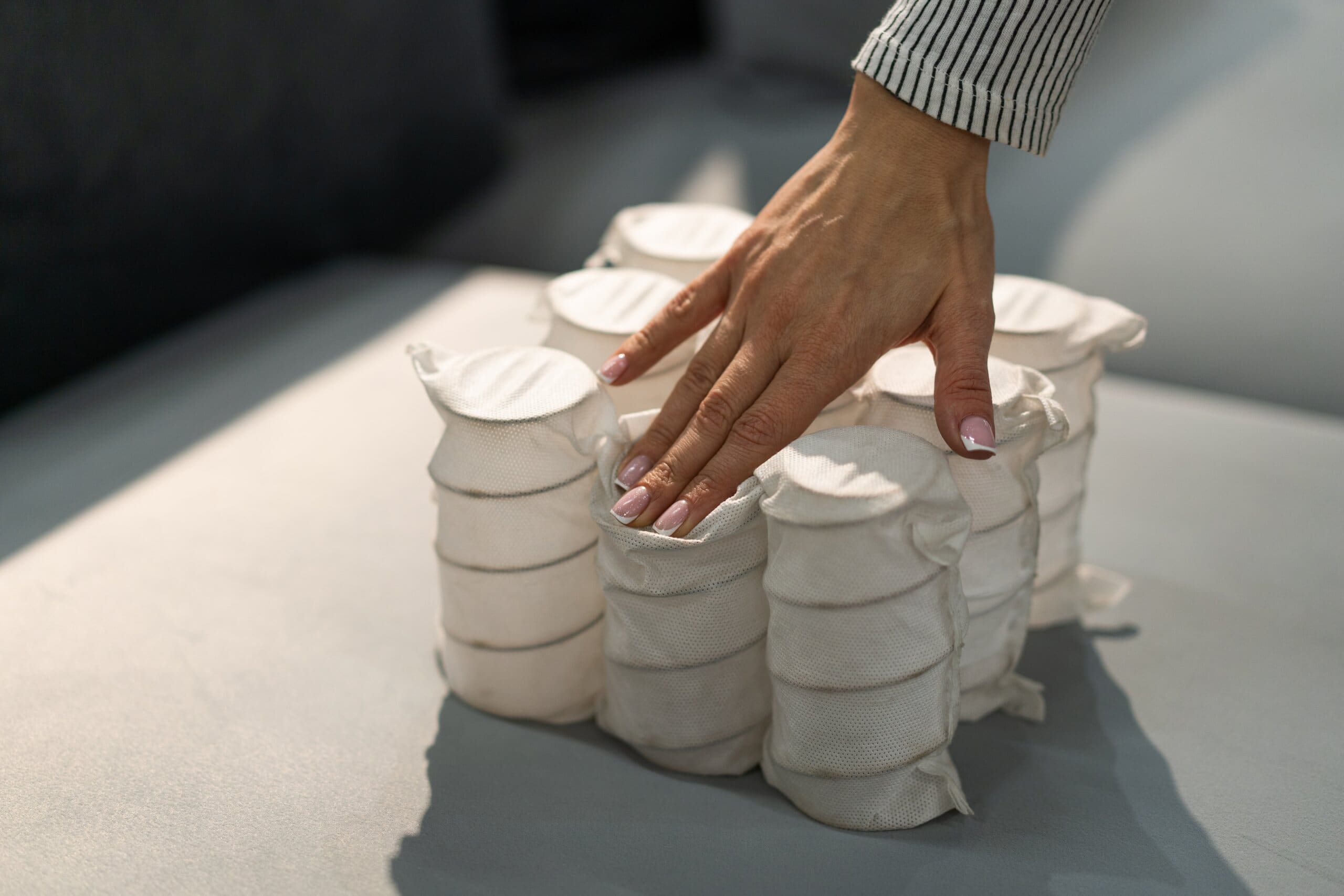
Pocket sprung mattresses feature individually pocketed springs that move independently of one another. This makes them great at targeting your pressure points as you move - plus, the more coils in the springs, the more reactive the support.
Memory foam mattresses
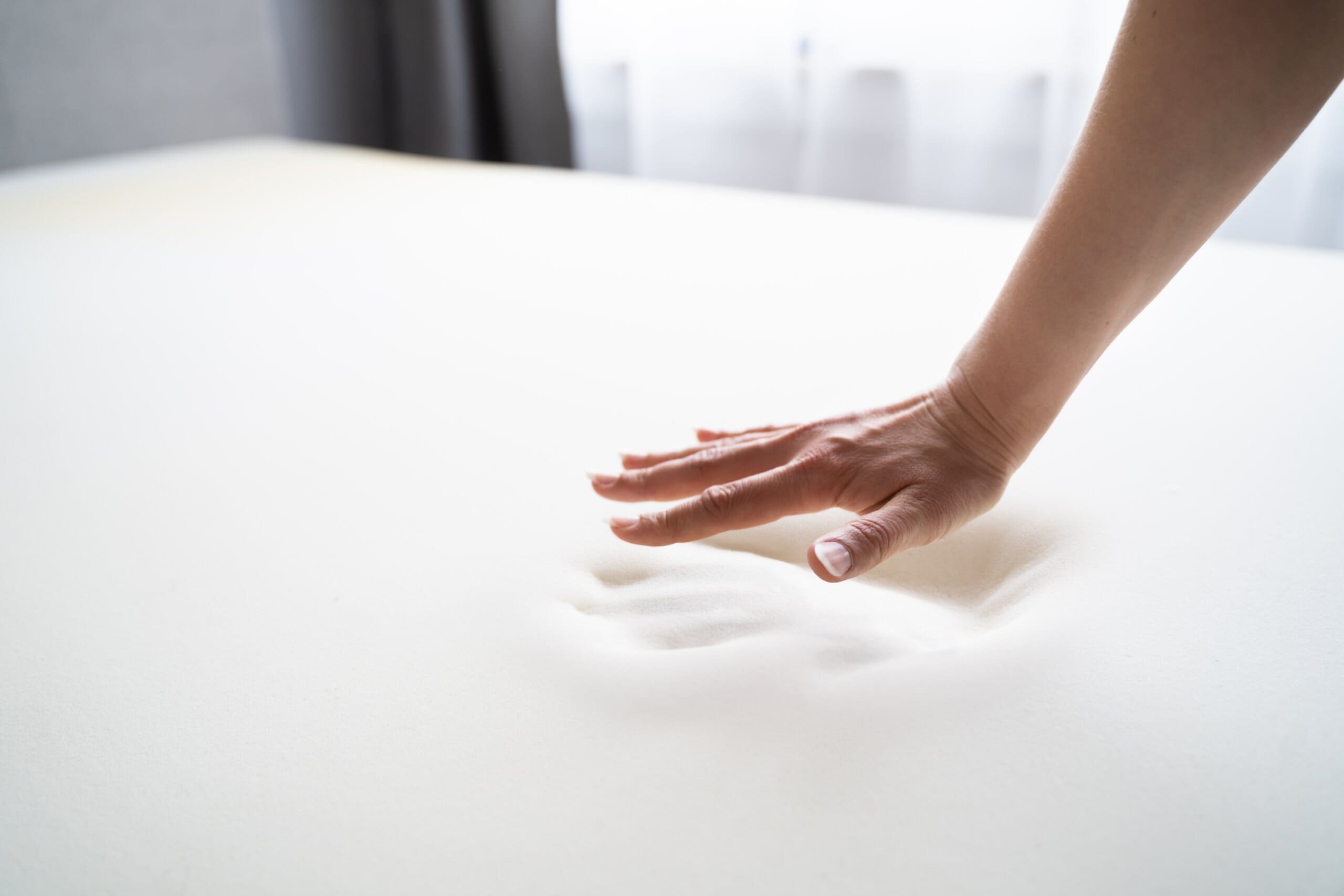
- Supportive and provides a weightless sensation
- Soft, ‘sink in’ feeling
- Suitable for all sleeping positions
- Available in a range of firmnesses and densities
- Contours to your individual body shape
- Targeted support at every pressure point
Created for the NASA space program, the foam mattress is now hugely popular. A dense foam that returns to its original shape as soon as pressure or weight is removed, memory foam is able to contour to your unique body shape, providing personalised support.
Our Memory Foam Buying Guide can give you more information and advice about finding the perfect memory foam mattress for you. Also, if you're interested in memory foam but unsure of how its thickness and density works, read our Memory Foam Thickness and Density Guide.
Hybrid mattresses
- Combines foam and springs for a ‘best of both worlds’ experience
- Reduced motion transfer and added edge support
- Breathable for a refreshing night’s sleep
- Excellent support as well as intense comfort
- Available in a range of comfort gradings
- Often features special elements such as cooling gel or reflex foam
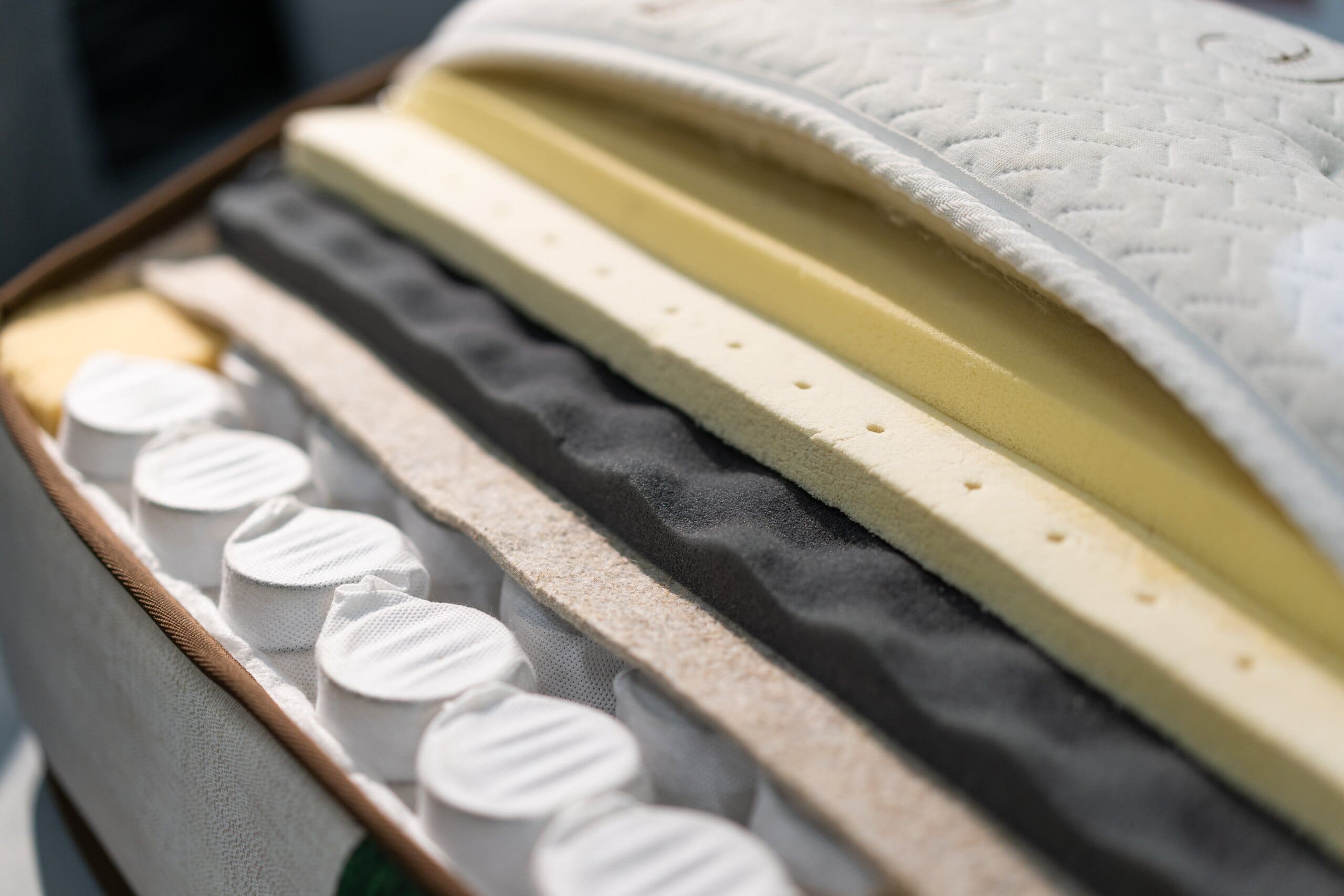
These mattresses use both springs and foam layers and are one of the best types of all-purpose mattress. They are available in a range of firmness ratings, combining the supportive elements of pocket springs with the contouring comfort of memory foam.
Latex mattresses
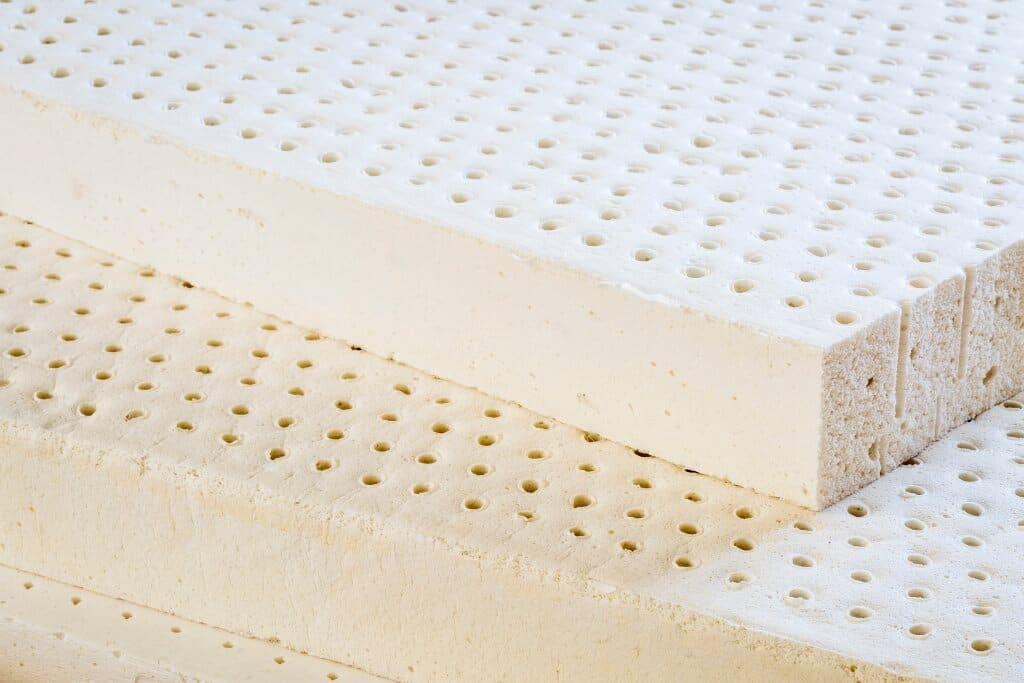
- Resistant to mould and dust mites
- Similar to memory foam without the heat retention
- Superior air circulation and anti-allergy
- Moulds to your unique body shape
- Less compression - denser and more supportive than memory foam
- Excellent pressure relief and a weightless sensation
- Supports your pressure points with precision
Latex mattresses contour to your body in a similar way to memory foam, but are more dense and less likely to sag over time. They are one of the best mattresses for those who suffer from allergies or respiratory conditions, made from natural materials. They create a hostile environment for bugs, mites, dust and canker, while often incorporating pocket springs to offer vital support.
Pillow top mattresses
- Hotel bed experience
- Supportive pocket springs target pressure points
- Soft pillow top ensures ultimate comfort
- Cloud-like, weightless feeling
- Available in a range of firmnesses
- Luxurious, high-end feel, but not necessarily more expensive than other mattresses
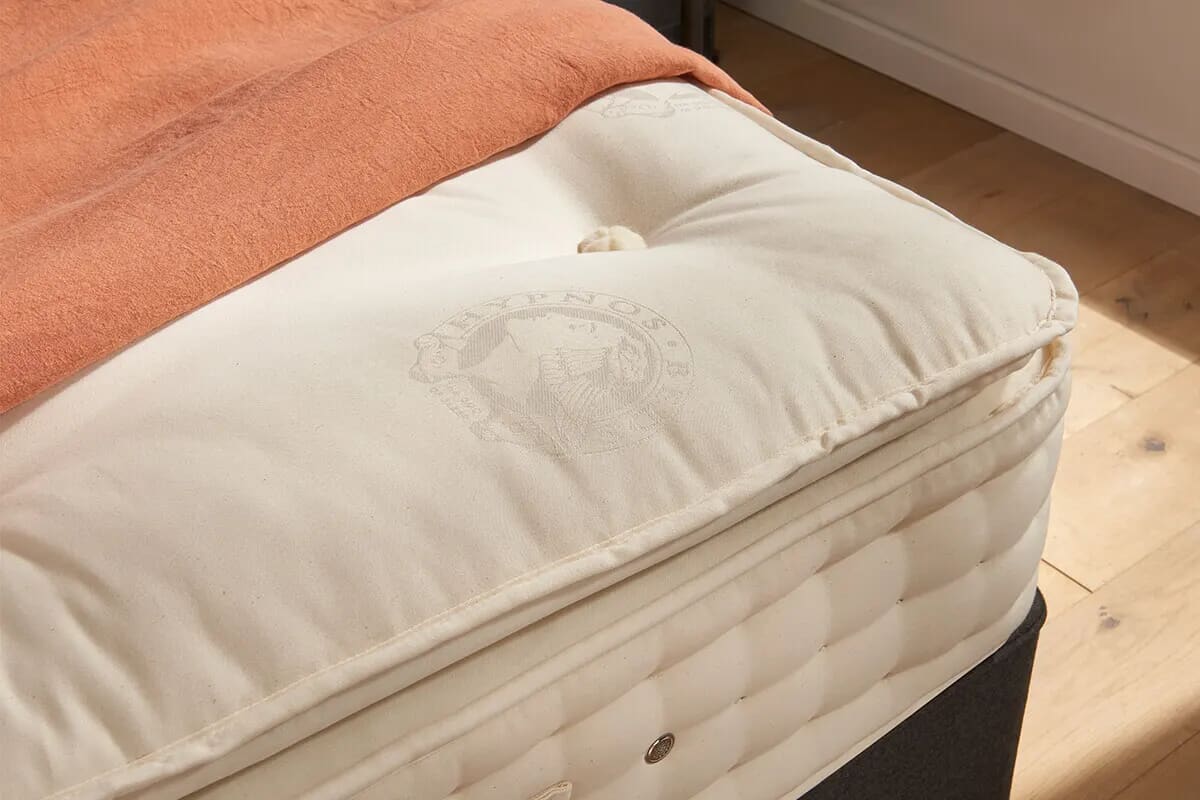
Pillow top mattresses are similar to hybrid mattresses, in that they comprise of supportive pocket springs, but have a ‘pillow’ of various comfort fillings stitched on top, rather than sheets of foam layered on top. This pillow top can feature anything from wool and alpaca fleece, to special cooling gel memory foam.
Choosing the right size mattress
Choosing your mattress size will depend on the size of your bedroom and who the bed is for - you may only need a single bed for a small guest room or young person’s bedroom, but a couple might want to choose a double or king-size, depending on the overall look and size of your room.
The size of the mattress for your bed will depend on your bed’s dimensions. The basic UK sizes are:
| Size name | Dimensions | Ideal for |
| Small Single | 75 x 90cm / 2'6" x 6'3" | Children, narrow bedframes & small bedrooms |
| Standard Single | 90 x 190cm / 3' x 6'3" | Children, teenagers, single sleepers |
| Small Double | 120 x 190cm / 4' x 6'3" | Smaller bedrooms, single sleepers wanting more space, spare bedrooms |
| Standard Double | 135 x 190 cm / 4'6" x 6'3 | Couples, larger spare rooms |
| King | 150 x 200 cm / 5' x 6'6" | Taller people, couples |
| Super King | 180 x 200 cm / 6' x 6'6" | Spacious sleeping, larger bedrooms |
If you’re taller and find your feet hanging off the end of your bed when you lie flat, you need to consider a larger size. While most single and standard double sizes will be fine for most people, those over six feet may find a king-size or even a super-king more comfortable.
If you’re still unsure which size is right for you, visit our Ultimate UK Bed & Mattress Size Guide to find everything you need to know about choosing the right mattress size for you.
Try our super helpful MattressFinder™ tool, which uses your answers to a few simple questions to calculate the best type of mattress for you.
Which mattress is right for me?
It can be difficult to know which mattress will be right for you in the long run - simply testing one in a showroom won’t tell you if it’s going to be suitable for your body after sleeping on it for months. We also understand you might be hesitant to buy a mattress online, as you can’t test it out beforehand. Fortunately, we offer 100 Night Sleep Trials on a huge range of our products, so you can test it out for a while before making your decision. Our Sleep Trial page will give you more information.
How to choose a mattress in 10 easy steps
As we’ve mentioned, finding your perfect mattress isn’t always as easy as it looks. Luckily, we’ve provided ten top tips for buying a new bed. If you consider each of these steps, you'll be sure to choose the perfect one for you.
Remember, we offer free next day delivery on a huge range of mattresses, so you can be enjoying your perfect pick sooner rather than later.
1. Choose your mattress type:
When choosing a new mattress, you’ll notice there are a whole host of different types, from pocket sprung to memory foam - all constructed to suit different needs. Hybrids tend to offer ‘the best of both worlds’, but it’s important to consider which type is best for your personal body. We have lots of helpful guides to mattresses that can help you out - check out our Memory Foam Mattress Buying Guide, for example.
2. Think about mattress firmness:
There are several different levels of firmness to choose from. You might choose from soft, medium or medium-firm. However, if you require more support you may choose firm or extra firm - this firmness is especially recommended for heavier people, to give them more support.
The firmness of a mattress can often be detected by touch - the feel can tell you a lot. This can be quite subjective, but a softer mattress will give you a ‘sinking’ feeling, while a firmer one will feel more like you’re ‘on’ the bed, rather than ‘in’ it. What you choose here is entirely down to personal preference, and you’ll find we stock a variety of firmness options.
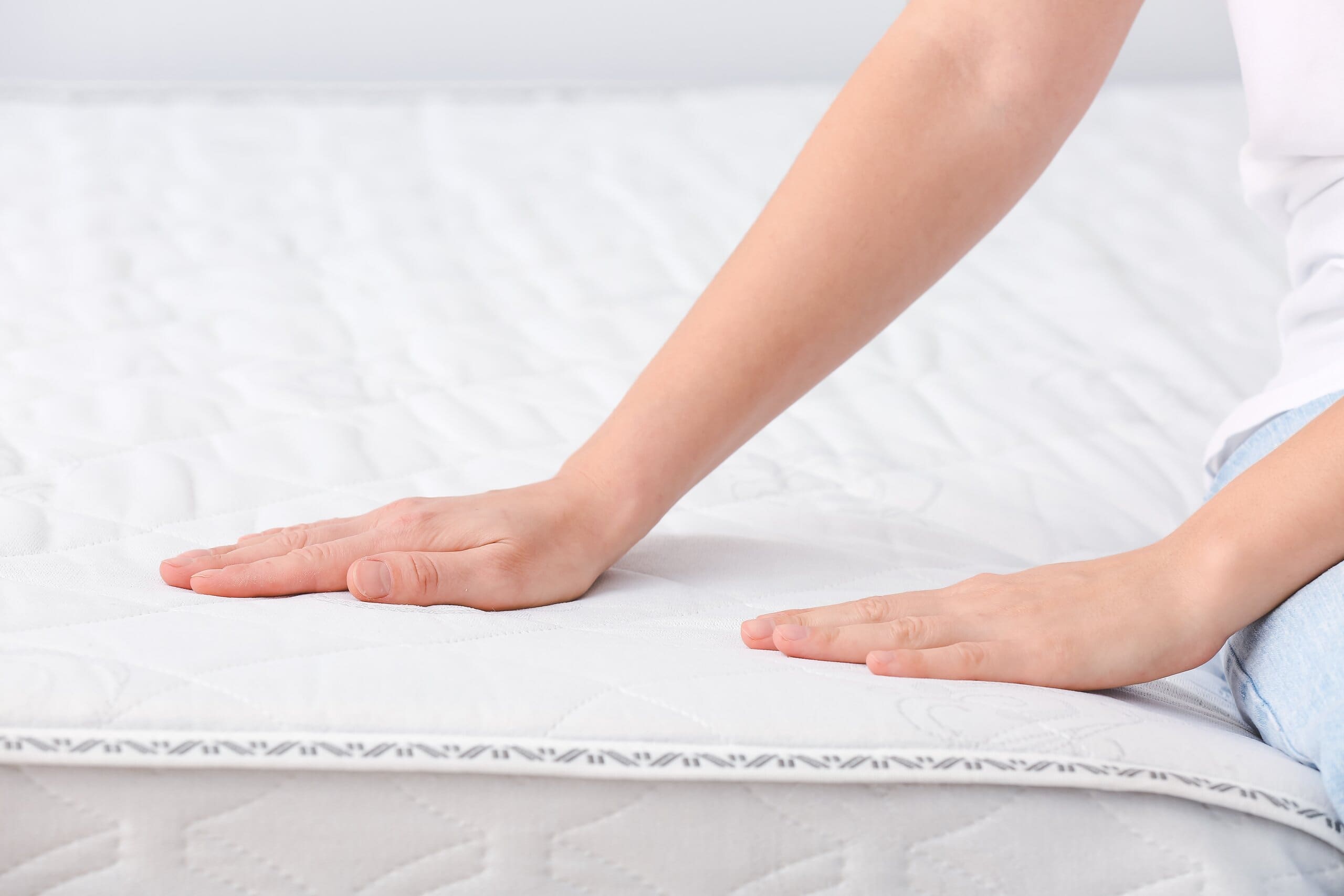
Firmness is one of the key aspects to consider before purchasing a new mattress. If you select a unit that is too soft or too firm for you, then you are likely to not sleep well, and could even develop issues with your back and other joints (a firmer, orthopaedic mattress can help here if you frequently suffer from aches and pains). Considerations such as your body type, sleep needs and sleeping position will all impact the level of firmness you need.
Our Mattress Firmness Guide has all the information you could need about selecting the right mattress firmness for you.
3. Choose the right mattress size:
You might find that one of the most important factors in choosing a mattress is the size. The UK and Europe have different specs for bed sizes, so make sure you check the exact measurements before making your final decision on which to choose.
In terms of standard UK measurements, you will find small single, single, double, king-size or super-king size mattresses.
We also offer a range of kid's mattresses, including cot and cot bed - the ideal sizes for growing children.
Our Ultimate UK Bed & Mattress Size Guide has all the information you need to make sure you choose the right size for your needs, as well as the exact measurements of each size in both imperial and metric.
You might also want to consider your desired mattress depth. Whether you have a low bed frame and need an extra deep mattress, or prefer a high bed, you should be sure to look for the depth measurements so you can accurately envision how it will look in your bedroom.
4. Consider your budget:
Potentially one of the most important aspects people consider when purchasing a new bed is how much they're willing to spend. We are dedicated to getting you the best deals on any mattress, bed or accessory, and our prices start from as low as £99 all the way up to nearly £2000. If you're looking for cheap double beds with a mattress for under £100, for example, our sale page has plenty of deals.
While it could be argued that you ‘get what you pay for’ in terms of quality, many modern mattresses are able to include a number of different comfort and support features at very little extra cost. You don’t need to spend thousands of pounds on a mattress for it to be exactly what you need for a perfect night’s sleep - it just needs to be the right one for you.
We also offer helpful ways to pay, such as paying in 30 days or in 3 installments with Klarna. Find out more on our Finance page.
5. Your sleeping position plays a part:
Your sleeping position should be a big part of your decision. Whether you’re a front sleeper, side sleeper, or sleep on your back, the best type of mattress for you will be different.

For example, a front sleeper won’t feel as comfortable on a soft mattress as they would a medium firm one, and a back sleeper might prefer orthopaedic support features to give them extra spinal support.
You can take a look at our guides for The Best Mattresses For Side Sleepers, The Best Mattresses for Front Sleepers and The Best Mattresses For Back Sleepers to help you make your decision.
6. Your body type may make a difference:
Different body types are more comfortable on different surfaces - not every body type is suitable for every mattress. For example, if you are heavier, you may find that a high density memory foam mattress is a good choice, while a lighter person may not feel any benefit.
It would also be advisable for a heavier person to invest in a firmer feel, which does not have as much ‘give’, and has more layers within it to provide increased support.
Your body type may also change over the years, for example if you become pregnant. In this instance, a hybrid mattress is an excellent choice, as you can receive both the support from the pocket springs, as well as the contouring comfort of the memory foam.
If you’re pregnant or planning for a baby, you can read our post on The Best Mattresses For Pregnancy for more advice.
7. Consider your individual sleep needs:
You may have some specific sleeping needs that need to be met. For example, if you are a hot sleeper, you may require features that ensure you do not overheat during the night and disturb your sleep. Luckily, we offer a range of cooling gel mattresses that are perfect for preventing night sweats. You can read our Cooling Mattress Guide for more information on how to get a cooler night's sleep if you suffer from overheating.
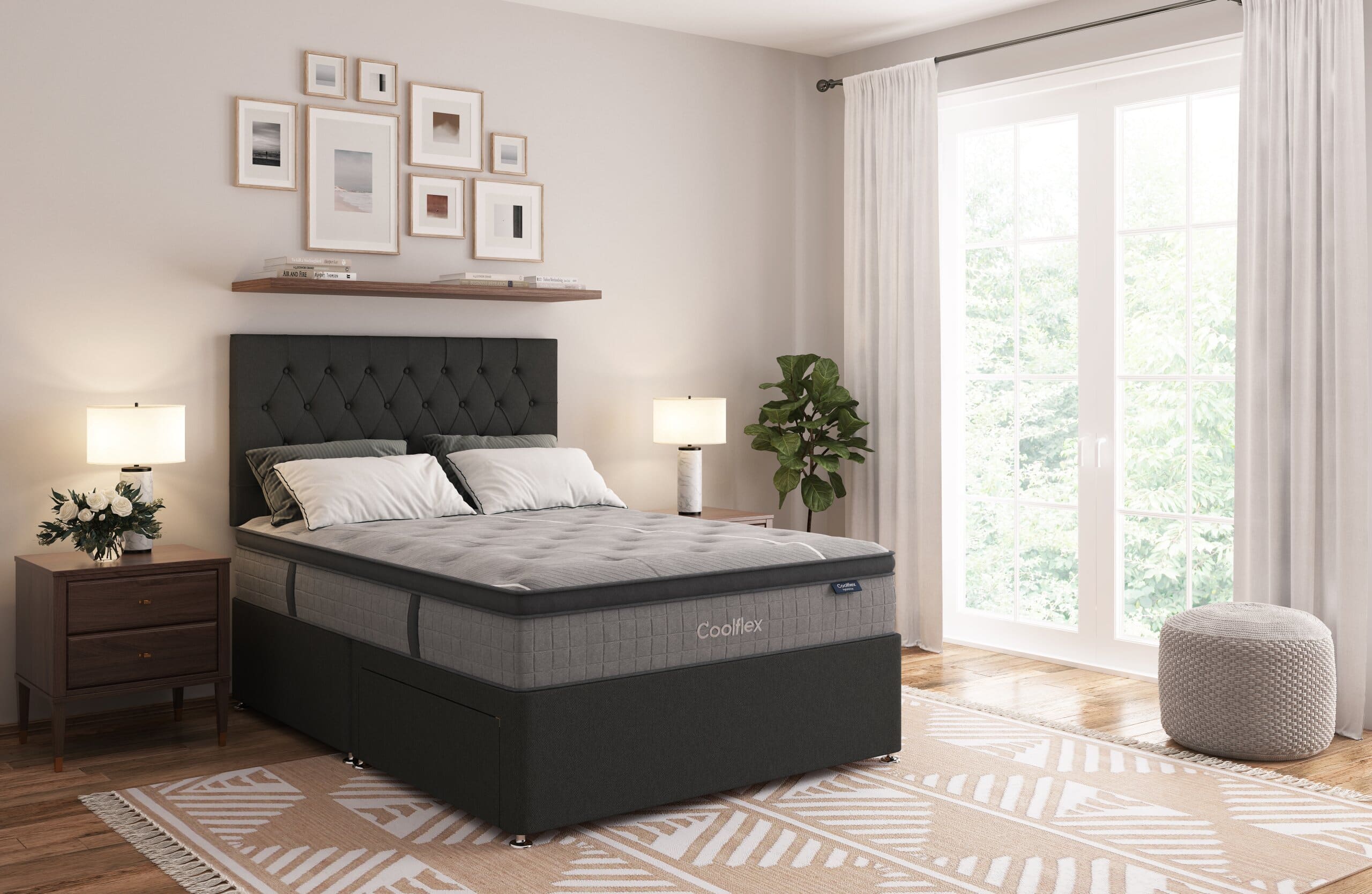
Those who suffer with joint or back pain, or even arthritis, may want to invest in an orthopaedic mattress, as this will offer the highest level of support to your body. If you’re an allergy sufferer, consider natural fillings, or antimicrobial and anti-allergy properties. We also offer a range of hypoallergenic mattresses, ideal for those who want a more hygienic night's sleep.
8. Look for special features:
There are a range of different construction features on the market which you should take into account when choosing your perfect fit. You may want to buy a new mattress that has extra edge support which can help you to sleep more soundly, or one that has ‘no roll together’ technology to keep you and your partner separate during the night. Which features are important to you will again differ based on your specific needs.
Lots of modern mattresses have innovative features that can help you get your perfect night’s sleep, so be sure to take advantage of the ‘features’ and ‘comfort fillings’ filter options when browsing our site.
9. Test a mattress our with our Sleep Trials:
We offer 100 Night Sleep Trials on a huge range of our mattresses. If you’re not sure which is right for you, this makes it really simple to test out a mattress, and simply send it back if it’s not quite right.
This is a really helpful way of seeing what works best for you. You might think you need a firm feel, but when it arrives you discover you prefer a softer feel - no problem! Just make sure you’ve chosen a sleep trial mattress and have kept it clean. Then you can make sure you get the exact features you need next time.
10. Make sure to invest in mattress protection:
New mattresses need to be maintained in order to get the most from them and keep them in great condition. In order to do this, you should take care of it by turning it to make sure one side does not become more used and damaged than the other. Of course, some mattresses are ‘no turn’, so do be sure to check your manufacturer instructions to ensure you care for it properly.
You can also clean your mattress frequently in order to keep it fresh, and reduce the chances of any dirt buildup. Perhaps the best investment you can make once you've made your purchase is a mattress protector. Not only can this keep your sleeping environment safe from stains, but it can also make it a little more comfortable and extend its lifespan.



